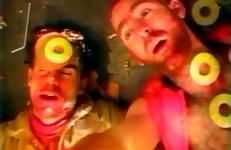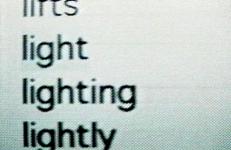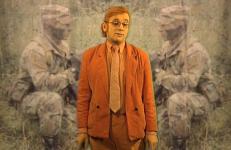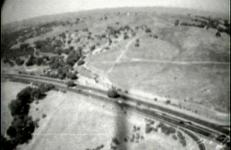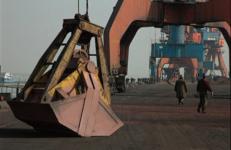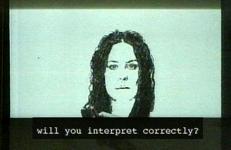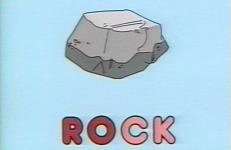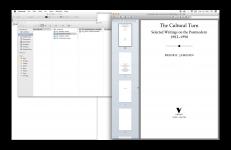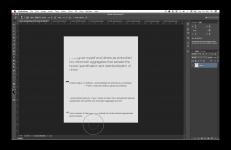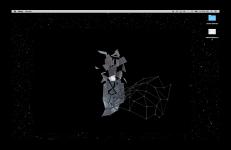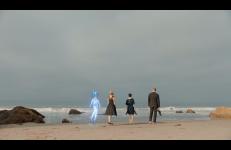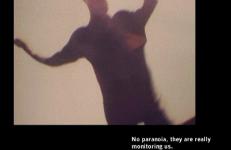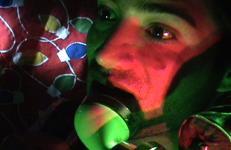A video diary about Cuthand's efforts to undergo artificial insemination. Cuthand contemplates a desire to have children and its relation to preserving Indigenous culture.
Future
The distant future. An orbital facility of unknown origin. Here, the debt of taking a life will be finally repaid…. through resurrection. The victims of military violence across time are systematically brought back to life and guided through the all-too-familiar facility. As a staff of identical ushers draws back layers of confusion and pain, the freshly resurrected gradually become aware of the reality of their corporeal reinsertion: perhaps the world of the living is not a world at all; to be alive in this place may merely be an exhibit.
The distant future. An orbital facility of unknown origin. Here, the debt of taking a life will be finally repaid…. through resurrection. The victims of military violence across time are systematically brought back to life and guided through the all-too-familiar facility. As a staff of identical ushers draws back layers of confusion and pain, the freshly resurrected gradually become aware of the reality of their corporeal reinsertion: perhaps the world of the living is not a world at all; to be alive in this place may merely be an exhibit.
The distant future. An orbital facility of unknown origin. Here, the debt of taking a life will be finally repaid…. through resurrection. The victims of military violence across time are systematically brought back to life and guided through the all-too-familiar facility. As a staff of identical ushers draws back layers of confusion and pain, the freshly resurrected gradually become aware of the reality of their corporeal reinsertion: perhaps the world of the living is not a world at all; to be alive in this place may merely be an exhibit.
This first work in the HalfLifers' Action Series plunges into a world of frantic heroes trapped in a continual crisis of dissolution and reification. An ordinary domestic setting is recast as a psychoactive landscape in which the concept of function becomes situational and fluid. Only through the strategic application of organic and inorganic “devices” can this zone be successfully navigated and the mission be saved.
Alphabetically Sorted is a scrolling list of 644 keywords downloaded from CompuServe and spoken by “Victoria: High Quality,” a speech synthesis program.
This title is only available on e-(d)entity.
Archives recovers the formal community that mobilizes the diagrammatic experience of archives, a formal community that claims the sensory nucleus where hypertrophic rhythms, abstract machines, monuments and memorials, digital servers, corporate architecture, traffic and computer flows, light brutalisms, digital gadgets, detention camps, prisons and hospitals, institutes and academies, universities and housing all integrated in the rhythmic and diagrammatic outburst of the archives.
San Francisco is a city where the virtual and the real co-exist. It is both a center of multi-media and Internet activity, and a city with a vibrant street life and commitment to public space. Awakening From the 20th Century explores these issues by asking the questions: Is life becoming virtual? Are we witnessing the end of the city? Will the computer replace the automobile?
This title is also available on Chip Lord Videoworks: Volume 2.
Because of the War things were changing. Very few toys or games were left and music was almost over. Tap water was tasting female and television only came in nasty spasms…
A surreal and sometimes comic meditation on how war affects the hopes and dreams of ordinary people.
"A film about the time of the blast furnaces — 1917-1933 — about the development of an industry, about a perfect machinery which had to run itself to the point of its own destruction. This essay... on heavy industry and the gas of the blast furnace, convinces through the author's cool abstraction and manic obsession, and through the utilization of a single example of the self-destructive character of capitalistic production: 'The image of the blast furnace gas is real and metaphoric; an energy blows away uselessly into the air. Guided through a system of pipes, the pressure increases.
BIT Plane is a highly compact spy plane, wingspan 20 inches, radio-controlled, video-instrumented and deployed over areas of scenic interest. Due to its refined dimensions, BIT plane is able to enter territory inaccessible to other aircraft. Pioneering flight: in an aerial reconnaissance over the Silicon Valley, California 1997, BIT plane flew solo and undetected into the glittering heartland of the Information Age.
(chatlandia) uses the public bathroom stall as format and metaphor for Internet relay chat lines (IRCs). The video's soundtrack is composed from transcripts of actual IRC sessions; the conversations emerging from this institutional facade speak of lust, intimacy, spunky women, and "what Desiree wants," calling into question the division between humans and machines. In (chatlandia) the larger theme of how the 'net functions as social space is explored and encourages the viewer to ask: Is the Information Age actually bringing us closer together or pushing us farther apart?
(chatlandia) uses the public bathroom stall as format and metaphor for Internet relay chat lines (IRCs). The video's soundtrack is composed from transcripts of actual IRC sessions; the conversations emerging from this institutional facade speak of lust, intimacy, spunky women, and "what Desiree wants," calling into question the division between humans and machines. In (chatlandia) the larger theme of how the 'net functions as social space is explored and encourages the viewer to ask: Is the Information Age actually bringing us closer together or pushing us farther apart?
Taiwanese artist Shu Lea Cheang (b. 1954) tackles conceptions of racial assimilation in American culture, examining the political underbelly of everyday situations that affect the relationship between individuals and society.
China Town traces copper mining and production from an open pit mine in Nevada to a smelter in China, where the semi-processed ore is sent to be smelted and refined. Considering what it actually means to "be wired" and in turn, to be connected, in today's global economic system, the video follows the detailed production process that transforms raw ore into copper wire--in this case, the literal digging of a hole to China--and the generation of waste and of power that grows in both countries as byproduct.
"code switching began as a contemporary reaction to Adrian Piper's Cornered (1988). It goes on to explore the fracturing of contemporary identity within modern culture, and the mechanisms by which individuals assign and create the cultural, racial, personal, and social identities around us. We all have codes by which we interact with and interpret others. Depending on what situation we are in, we adopt the appropriate persona to fit the occasion, constantly creating representations for others to read appropriately.
By accident, the content of a computer encyclopedia is transferred into the brain of an animated parrot resulting in the emotional breakdown of a fine peach.
"I would never have known how to do anything on my computer if it wasn't for Computer Smarts."
—Mark Roth
This title is also available on Animal Charm Videoworks: Volume 3, Computer Smarts.
Constituting an Outside (Utopian Plagiarism) is part one of Zach Blas's Contra-Internet Inversion Practice series. Contra-Internet Inversion Practice confronts the transformation of the internet into an instrument for state oppression and accelerated capitalism.
Social Media Exodus (Call and Response) is part two of Zach Blas's Contra-Internet Inversion Practice series. Contra-Internet Inversion Practice confronts the transformation of the internet into an instrument for state oppression and accelerated capitalism. Invoking a practice of utopian plagiarism, Contra-Internet Inversion Practice experiments with queer and feminist methods to speculate on internet futures and network alternatives.
Modeling Paranodal Space is part three of Zach Blas's Contra-Internet Inversion Practice series. Contra-Internet Inversion Practice confronts the transformation of the internet into an instrument for state oppression and accelerated capitalism. Invoking a practice of utopian plagiarism, Contra-Internet Inversion Practice experiments with queer and feminist methods to speculate on internet futures and network alternatives.
Contra-Internet: Jubilee 2033 is a re-imagining of scenes from filmmaker Derek Jarman’s 1978 queer punk film Jubilee, starring Susanne Sachsse and Cassils. Contra-Internet: Jubilee 2033 follows author Ayn Rand (Susanne Sachsse) and members of her Collective, including economist Alan Greenspan, on an acid trip in 1955. Guided by an artificial intelligence named Azuma, they are transported to a dystopian future Silicon Valley.
The Dresden Codex is a prehispanic book that was kidnapped and was rediscovered in the city of Dresden, Germany. It keeps a presage of a destruction to come.
During 1998 and 1999, Pelon participated in various Internet newsgroups and lists where suicide is the main subject. Stories unfolded as the film was made; some reached the point of no return. The subject of suicide is very candid on the Internet, due to its anonymity and the freedom it allows from the usual taboos around the subject. The newsgroups and lists have become a relatively safe place for the many people that find themselves isolated because of their interest in the idea of suicide.
Earth, in the remote future, is visited by a Cyborg sent out to populate the Universe. The Sun will soon go Nova in its old age, and the Cyborg's visit is a 'mission' to save his earthbound humans from total extinction in this Sci-Fi saga.
This European flavored melodrama depicts a fictional country of refined manners and debased desires that explode into chaos, sending its prodigal son into the pit of 20th Century technology. That technology externalizes his hidden beauty just as he tries to hide the heritage of horror which was the curse of his lineage. That curse now threatens the already damned.






